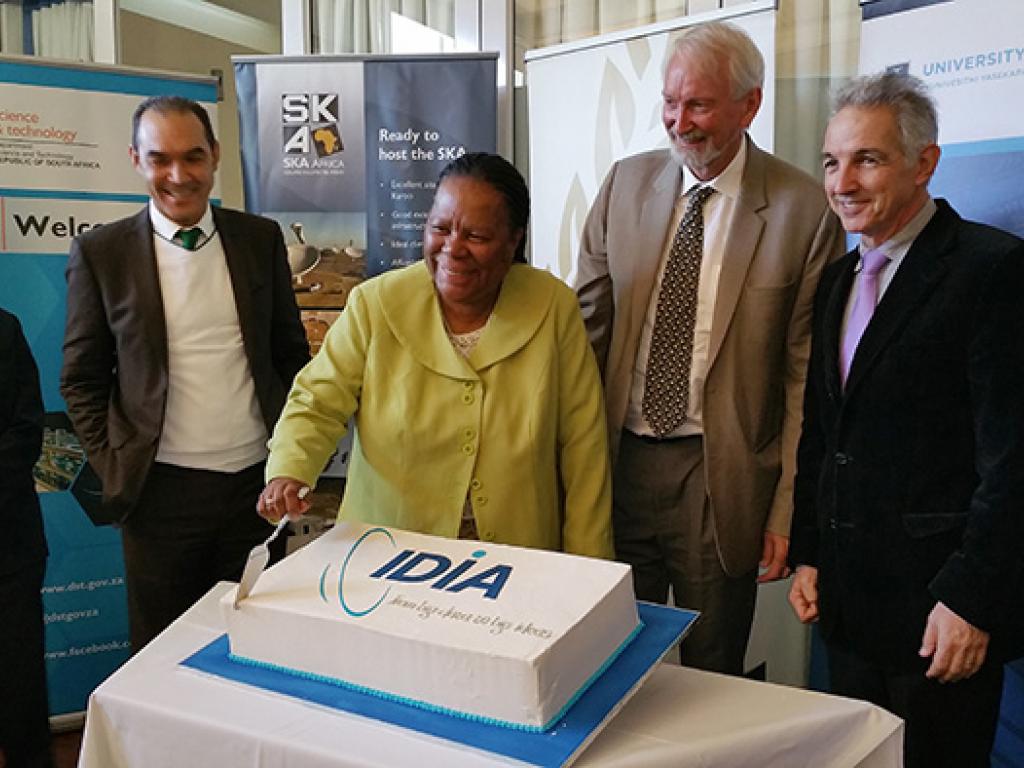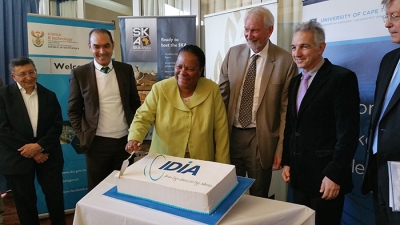Big Data Institute to Boost SKA


Icing on the cake: The launch of the new Inter-University Institute for Data-Intensive Astronomy (IDIA), was celebrated at a ceremonial cake cutting. Launched at the South African Astronomical Observatory, the IDIA is a partnership between UCT, the University of the Western Cape and the North-West University. In picture are (from left) Bernie Fanaroff, Prof Tyrone Pretorius (UWC), Naledi Pandor, Prof Russ Taylor, Dr Max Price, and Prof Frik van Niekerk (NWU).
The R50-million, five-year IDIA partnership will corral researchers in astronomy, computer science, statistics and eResearch technologies to create data science capacity for leadership in the MeerKAT SKA precursor projects, other precursor and pathfinder programmes and SKA key science.
The institute is expected to make a significant contribution to South Africa's research enterprise. It will act as a growth point for a larger partnership that will include other South African universities and African institutions that are part of the continent's SKA partnership.
Importantly, the IDIA's SKA-driven Data-Intensive and Research and Training Programme is expected to drive innovation in big data solutions that will have an impact beyond astronomy, said guest speaker Naledi Pandor, Minister of Science and Technology.
"We will be working proactively to transfer knowledge and expertise to benefit a broad range of data-challenged domains in science, humanities and commerce."
SKA data challenge
The biggest scientific project in history, the SKA will see the construction of the world's largest radio telescope, with over one square kilometre of collecting area. This will enable astronomers to see back in time to the beginnings of the Universe and to answer some fundamental questions about its origin and evolution.
The SKA also drives one of the world's most significant data challenges. Data will account for much of the total project's costs, expected to run into billions of Euros.
"Much will be spent on relaying, storing and analysing the data captured by the antennae, a task that will require processing power estimated to be equal to several million of today's fastest computers," said Pandor.
"SKA challenges big data to the extreme."
Set to become a trillion-dollar industry in the next decade, big data challenges the country's higher education institutions and science and research community, said SKA director Dr Bernie Fanaroff.
IDIA founding director Professor Russ Taylor (joint UCT/UWC SKA Research Chair) said: "Universities that rise to the challenge of the data revolution will be globally competitive in this new era of data-intensive research."
"The IDIA initiative is therefore a timely intervention," added Pandor. "The new institute plans to provide training in SKA-driven data science research for up to 100 young data scientists over the next five years.
"SKA SA itself has a significant hardware definition composition programme that is starting to focus more on supporting work in the area of big data."
Step up
A focus on and investment in big data is crucial if South Africa is to play a significant role in the world economy in coming decades, the minister added. However, the worldwide shortage of data scientists is expected to become critical by 2018.
Fanaroff said the SKA team had started thinking of the big data challenge early on, as SKA required fast processing, the development of algorithms, machine learning, the visualisation of data and data transport – "all the things central to what probably will be the most socially and economically important industry of the next decades".
"At SKA we began to invest in big data three to four years ago before everyone began talking about it."
Now the IDIA project provides the opportunity for the South African university sector to jointly advance within the global SKA project as a leader in SKA data science.
Speaking at the launch, Vice-Chancellor Dr Max Price underscored the institute's strategic value.
"While we have the geographical advantage of the southern skies ... we don't really have any advantage when it comes to analysing the data. Once it's processed and stored, anyone can do this.
"The risk is that we become servants of scientists around the world and not a team and a country that can generate its own knowledge and that can play in the big league."
Leading universities at other SKA partner countries are already well advanced. Oxford University, for example, has announced the establishment of the Centre for Astrophysical Surveys, and Australia has established the Pawsey Centre, a huge performance computing and data centre in Perth.
Fanaroff said the Big Data Africa programme was already bringing researchers and institutions in SKA's African partner countries into the big data development.
"The IDIA will play a key role in partnering with universities in those countries."
Allied development
Another development in the programme is the African Research Cloud, which will allow African universities to link with South African universities and others in Africa and around the world.
"This will provide the infrastructure for data processing and research, initially in astrophysics, but will be available to go much more widely than that," said Fanaroff.
"We are working with the DST, the Centre for High-Performance Computing, the NRF and the IDIA to seek funding for this crucial project which has the potential to catalyse the African knowledge economy."
He said it was crucial that capacity be developed locally.
"We don't want the big data 'cut out of the ground' and exported to be processed and sent back with the published [research] papers ... We want the papers to be written here, the Nobel prizes to be awarded here – and the IDIA is a big step in that direction."
Universities boost capacity
The new Sol Plaatje University in Kimberley is the first institution in South Africa to offer a dedicated undergraduate degree in data science.
UCT is also well placed to contribute to the initiative, said Price.
"At UCT we host one of the leading astronomy research departments on the continent and several research chairs in observational astronomy.
"We knew we couldn't wait until the data was there, but needed to kickstart this process of investing in physical and research capacity: the human capital to get this off the ground.
As a result, UCT is set to launch two new programmes: a master's degree in data science and an interdisciplinary degree in data science, to be offered in 2017 with input from the departments of statistical sciences, computer science, astronomy, physics, bioinformatics and a large data warehouse in the commerce faculty.
"This is just a taste of the pathways the SKA is opening up in higher education. It's one of the many different ways the sector will enhance SKA's contribution to the continent.
"It's an excellent model, but we can't do this alone. We have to collaborate not only between universities but also with government and the DST.
"This is only the start. We need to ensure those research grants to ensure this gets wings and flies."
Story compiled by Helen Swingler. Photo by Steff Hughes.
